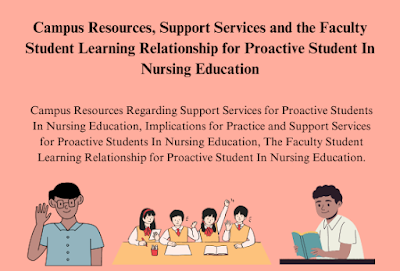The Campus Resources Support Services and the Faculty Student Learning Relationship for Proactive Student In Nursing Education. An effective learning objective should include the following five elements: who will learn, how much or how well, from what, and by when.
The Campus Resources Support Services and the Faculty Student Learning Relationship for Proactive Student In Nursing Education
In nursing education, fostering a proactive relationship between students and faculty, utilizing campus resources, and providing comprehensive support services are critical to student success and positive learning outcomes. A caring and dedicated faculty and well-utilized campus resources can significantly enhance students’ clinical learning experiences and overall academic performance.
The teaching/learning process follows the same steps as the nursing process, including assessment, diagnosis, outcome identification, planning, implementation, and evaluation, but in the following manner: Assessment: Data is collected about the client, their willingness to learn, and their current level of knowledge on the subject. The acronym SMART (specific, measurable, attainable, relevant, and time-bound) can be used to describe the elements of a well-formulated learning objective.
To ensure a supportive learning environment, it’s crucial for faculty to familiarize themselves with campus resources before they are needed. This includes understanding the available services such as counseling, student health, campus security, and disability services. Institutions might also offer specialized support for groups such as women, minorities, or LGBTQ+ students.
For serious concerns that affect safety, many universities now have formal committees that assess and coordinate responses to student behavior. This collaborative approach, involving multiple professionals, is preferred over isolated efforts by individual faculty members.
Building relationships with these support services can be facilitated by inviting their representatives to introduce their services to nursing faculty. This can be part of faculty professional development, helping educators understand when and how to refer students for support.
Implications for Practice and Support Services for Proactive Students
New faculty members often struggle with classroom management and student misconduct. It’s essential to anticipate potential issues and develop strategies for addressing them. Effective classroom management and meeting learning objectives require a proactive approach to student behavior.
Emotional intelligence, as outlined by Goleman (2005), can be a valuable tool for faculty in managing their role as facilitators and handling student conduct. Faculty should also be aware of ethical imperatives, such as those outlined in the Code of Ethics for Nurses (ANA, 2001), which stress the importance of professional behavior.
Ignoring inappropriate behavior can have serious consequences, including contributing to a negative learning environment and potentially influencing future professional conduct. Evidence suggests that students who exhibit unprofessional behavior may continue these patterns in their careers (Papadakis et al., 2005; Luparell & Frisbee, 2014).
Faculty must be self-aware and manage their emotions to maintain an effective learning environment. Negative emotions from student incivility can impact teaching motivation and self-esteem. Recognizing and addressing these feelings is crucial for maintaining objectivity and consistency.
Understanding generational differences and varying perceptions of behavior can help faculty communicate expectations more clearly. Online teaching environments also present unique challenges, where increased social presence and prompt responses are key to managing incivility.
The Faculty-Student Learning Relationship
Faculty often question their rights and responsibilities, as well as those of their students. These are guided by laws and institutional policies, which differ between private and public institutions. Institutions should develop clear policies regarding student and faculty behavior.
In addition to faculty development, institutions should provide student development programs to help students navigate their challenges and understand acceptable behaviors. Addressing student incivility is crucial for maintaining faculty well-being and job satisfaction.
Faculty play a significant role in creating a positive learning environment. They must be able to recognize and report early warning signs of misconduct, such as verbal threats or signs of distress. Collaborating with campus professionals to support struggling students is essential.
This chapter aims to equip future faculty with an understanding of disruptive behaviors and practical steps for maintaining a conducive learning environment. By leveraging available resources and implementing effective strategies, both faculty and students can achieve their educational goals in a respectful and productive manner.
Campus Resources Support Services and the Faculty Student Learning Relationship for Proactive Student In Nursing Education
Campus Resources Support Services and the Faculty Student Learning Relationship for Proactive Student In Nursing Education
Campus Resources Support Services and the Faculty Student Learning Relationship for Proactive Student In Nursing Education
Read More:
https://nurseseducator.com/didactic-and-dialectic-teaching-rationale-for-team-based-learning/
https://nurseseducator.com/high-fidelity-simulation-use-in-nursing-education/
First NCLEX Exam Center In Pakistan From Lahore (Mall of Lahore) to the Global Nursing
Categories of Journals: W, X, Y and Z Category Journal In Nursing Education
AI in Healthcare Content Creation: A Double-Edged Sword and Scary
Social Links:
https://www.facebook.com/nurseseducator/
https://www.instagram.com/nurseseducator/
https://www.pinterest.com/NursesEducator/
https://www.linkedin.com/in/nurseseducator/
https://www.researchgate.net/profile/Afza-Lal-Din
https://scholar.google.com/citations?hl=en&user=F0XY9vQAAAAJ
